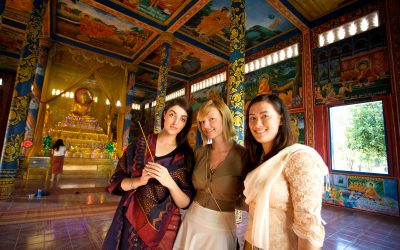History & Culture of Indonesia

History
Indonesia is an archipelagic country, made up of 17,508 islands located along the equator in Southeast Asia. Throughout history, claim to the land has been sought after by many different groups from many different regions due to its geographic position and bounty of natural resources.
The first people to arrive in the land that is known today as Indonesia were the Austronesian people, believed to have arrived as early as 2000BCE. This discovery of present-day Indonesia was followed the rule of the Srivijaya naval kingdom that brought with it influences from Hinduism and Buddhism; religions that reigned supreme in Indonesia until the introduction of Islam in the 13th century. The 16th century marked the arrival of Europeans in Indonesia.
Upon discovering the optimal trade location as well as the unique and plentiful natural resources possessed by these rich, lush islands, the Dutch began to move in on Indonesia, placing much of the land under colonial rule (around the same time that the Dutch East India Company was established). Dutch rule ended nearly 400 years later with the Japanese invasion of Indonesia during the Second World War.
Under Japanese rule, a stifled movement for independence reignited its flame and, after Japan’s surrender in 1945, a nationalist leader, Sukarno, declared independence for the country; although, this independence was not internationally recognized until 1949. Sukarno was overthrown as president in 1965 during an army-led anti-communist purge. His replacement, General Suharto, improved ties with the west, leading to several decades of economic prosperity. Suharto resigned in 1998 though after the economic decline due to the East Asian Financial Crisis. The new government has made greats steps towards strengthening the democratic process in the country.
Culture
The culture of Indonesia is a delightful melting pot if the ancient traditions of the indigenous communities mixed with many different foreign influences and religions, such as Hinduism, Buddhism, Confucianism, Islam, and Christianity.
Signs of these various influences can be seen in the food, art, dance, religious practices, and architecture throughout the country. However, the Western world has also had its impact on Indonesia through the veins of science, technology, modern entertainment, as well as through Indonesia’s political and social systems.
Though these foreign influences are apparent in most parts of the country, especially those traveled to by tourists, there are more remote areas that have managed to retain the pure and traditional indigenous customs, lifestyles, and religions.
News & Magazine
Things for Women to do In Southeast Asia
Groups of women travelers in Southeast Asia have fast become the norm. There are tours and trips which cater specifically for women, but we find that women are just as likely to do similar things to men. Most women may substitute an afternoon in the spa instead of...
The Trails of the Khmer Rouge
The Khmer Rouge were the ruthless followers of the Pol Pot who controlled Cambodia from 1975 to 1979. They were responsible for the deaths of more than 2 million Khmer people and then after the mass genocide they led Cambodia into a brutal civil war which lasted for...
Take a Trip in the Mekong Region – Southeast Asia
Visit the exotic countries of Myanmar, Laos, Thailand, Cambodia, and Vietnam. Southeast Asia has a lot of offer and these five largely Buddhist countries share many similarities but are also very different in their own unique way. Myanmar Myanmar is a very popular...
We are a registered tour company based in Southeast Asia. Our goal is to provide travelers the safe way to travel, feel warm, reliable and meet the right locals! More about AAT, here you are https://adventureasiatravel.com/about/ at the bottom











